In a recent "Virtual Press Conference" with Brazilian journalists, Damon Lindelof & Carlton Cuse were asked the following question:
"The female characters are complete in themselves and not dependent on the male characters to be believable. Was this something premeditated or something that came about gradually?"Now, by rights, the proper response to this question should have been uproarious laughter, but D&C shamelessly kept their faces straight and accepted what had to be the single most undeserved compliment in all their years of media junketry.
I love Lost for many, many reasons. I love all the psychological, spiritual redemptive themes of Lost and the mind twisting time space dilemmas it poses and the diabolical paradoxes of fate and free will it constantly traps its viewers in. But the one thing Lost is not is a show where women are complete in themselves and independent of men. Unfortunately, for all its fine qualities, its beauty, its mystery, its originality and creativity, when it comes to marginalizing and trivializing women, Lost is stuck on the same tired path that has been a trademark of our popular culture since the first dime novel showed up on the first general store shelf.
The Power of Numbers
No, not those numbers.
These numbers.
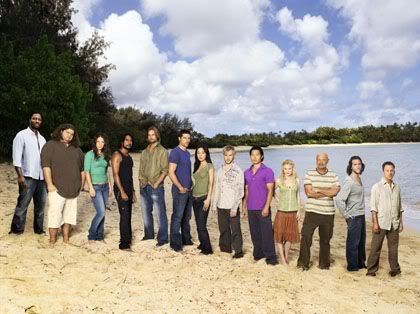
From the beginning, when the original cast presented us with 10 men and 4 women, through various permutations that have never improved the ratio beyond 8 men to 4 women, the sheer outnumbering of male to female has been obvious. The only places outside of government chambers you'll find those ratios are in a Chinese kindergarten.
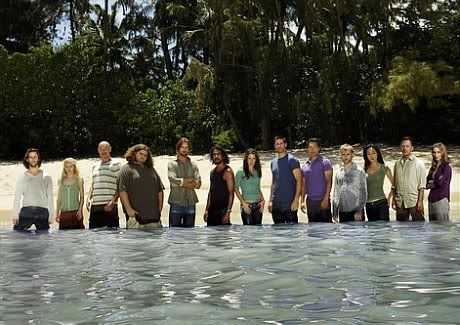
Women may represent over half of humanity, they may rapidly be assuming the role of most highly educated members of society, they may give birth to every last human who has ever crawled upon the earth...but on Lost, they appear to have been almost an afterthought.

What does it mean? Is the male experience twice as interesting as the female experience? Three times more interesting? Or is it just that in our popular culture, the male experience is more various, more intricate, more representative than the female experience?
Visually that's certainly true.
Men can be fat.
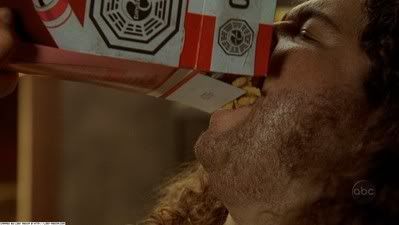
Over 40.
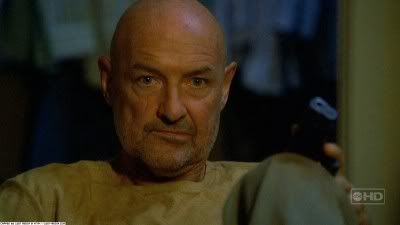
A little bit homely.
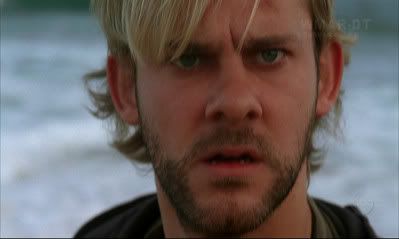
A little bit creepy.
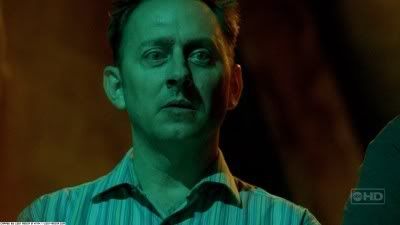
A little bit crazy looking.
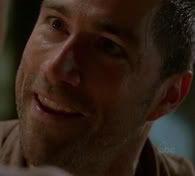
Women, on the other hand, are one size fits all:
all young,
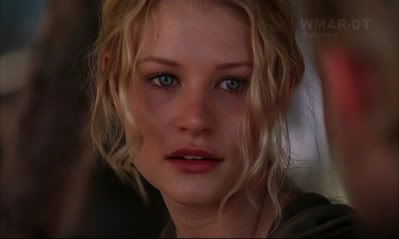
all thin,
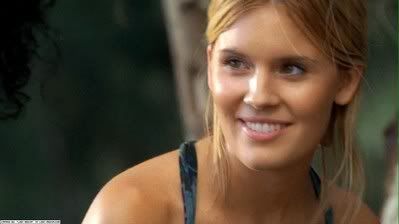
all gorgeous.
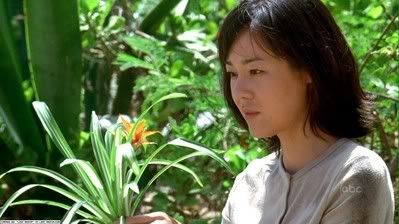
Although hair color is optional.
This lack of variety and originality in the portrayal of women has been the hallmark of Western classical culture and was even codified in that sacred literary dinosaur known as the Hero's Journey. The Hero's Journey that we're told makes up the DNA of virtually every story of the vast human experience is actually a metaphor for a mere sliver of it, the journey from adolescence to fully actualized adulthood. It may be the most self involved navel gazing sliver of it, but it's a mere fragment of the human experience nonetheless. And that sliver becomes even slimmer when we remember that the codifications of the revered Joseph Campbell in the early 20th century recognized only one kind of hero, the kind with testicles. In the Hero's Journey as laid out for us by tweedy male intellectuals writing from their airless, elitist libraries, the female enters only as the Goddess or as the Temptress. She is just another stage to be conquered, like the Innermost Cave, another object to be acquired, like the Oracle.
Women are sexual beings. Men are human beings.
In Western literature, males have many roles. They can play the part of
Hero

Anti Hero
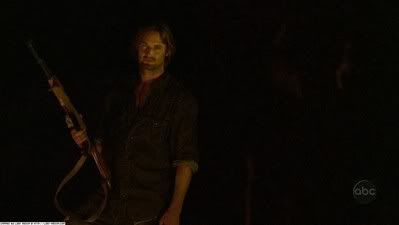
Sage
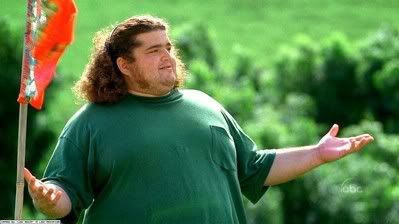
Jester
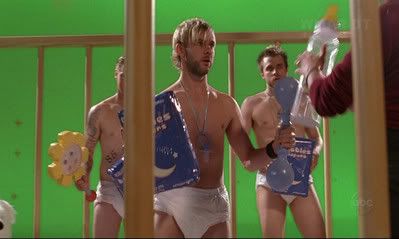
Villain
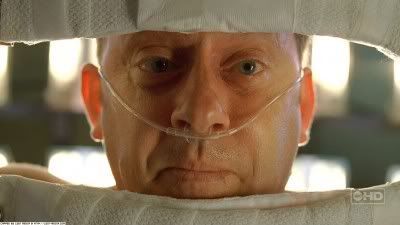
Mystic
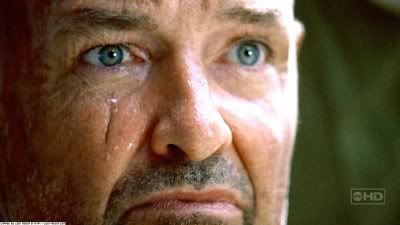
Seeker
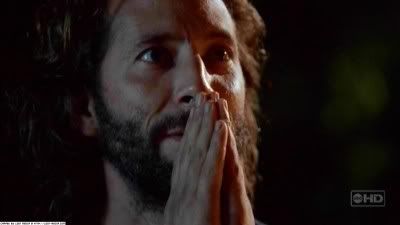
Warrior
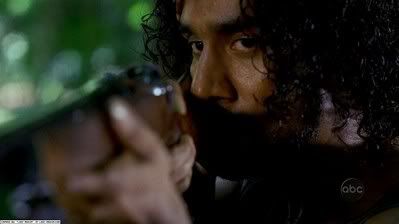
Men have many attributes, because male characters are consistently used to demonstrate the multiple facets of the human experience. In our culture, men are human beings. But women can be only two things - they can be Madonna or they can be Whore. Or to translate back to the almighty monomyth, they can be Goddess or they can be Temptress. In our culture, women are sexual beings.
Geek Chic
But Lost, for all its literary allusions and philosophical namedropping, is hardly a work of classical art. It's part of the great American POP culture. Which in today's America is a culture overrun by the avenging hordes of nerds, for whom a show like Lost is dear to their hearts. The Nation of Geek has expanded the acceptable limits of masculinity even further, to include men without muscles, beauty or social charms. But what about women? Do the geekstas show any willingness to extend their tolerant open minded views of ...themselves...to the half of humanity they share the world with?
Don't bet on it. Behind those cute blurry eyeglasses, it often seems that geekstas share a view of women that, while slightly more colorful and creative, is hardly more nuanced than that of their gangsta brethren. Not all comic book women are "light sucking voids", but aside from the occasional shooter-who-looks-like-a-DD-cup-pornstar, the primary function of video game or comic book women is to die (or be blinded, paralyzed, raped, partially eviscerated, locked in ice chests, mindswapped...or betray the good hero's loyalty and mutate into harpies, witches, vampires and insane psychotics.) Once upon a time there was a Buffy. Unfortunately, as soon as she had shut the Hellmouth, the geekverse she left behind reverted immediately to its true misogynist roots.
But come on! Sure, Lost has geek cred, but it isn't as bad as all that...is it? Let's see.
Where men on Lost die undergoing their Vision Quest
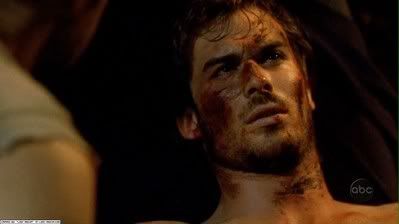
Or after facing their Final Judgment

Or in an act of selfless courage and sacrifice,
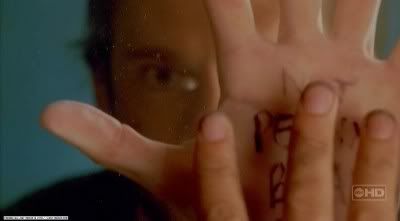
Women die....from having sex.
Sayid romances Shannon, and...
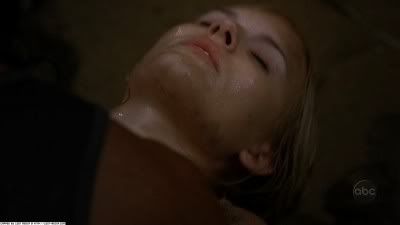
WAP!!!
Ana Lucia gets Sawyer's "gun", and...
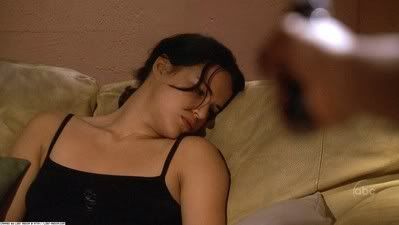
WAP!!!
Libby never went any further than a little innocent flirting with Hurley
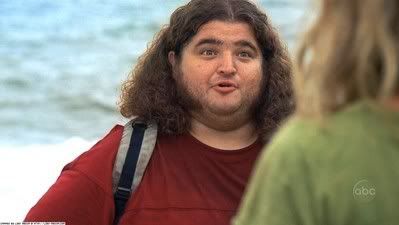
for which you'd think she'd get some mad points, but instead...
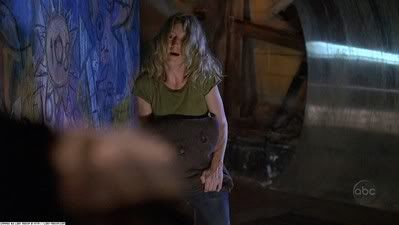
WAP!!!
Sun gets pregnant by her pretty husband
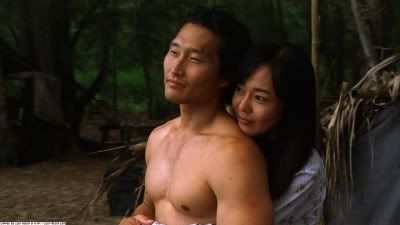
and is that a good thing?
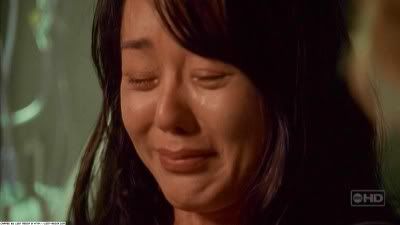
NOPE!!!
And of course, there's Kate...Kate, Kate, Kate. The free, unattached woman who embraces her sexuality openly with the man she loves, asserts her own desires and freely chooses what she wants

and, while they don't kill her off, they do make sure she's peeped on by her boss man
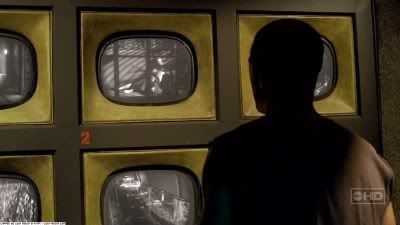
and humiliated over it
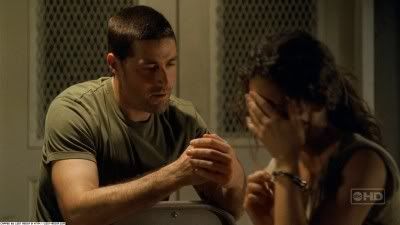
on multiple occasions
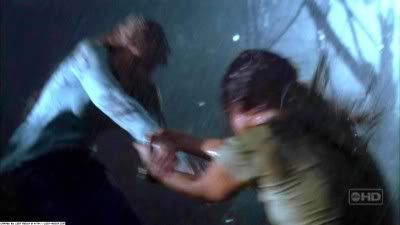
even to the point of leaving her chained and abandoned as a form of implied punishment for having the audacity to be so careless with the sacred ego of the alpha male.
In fairness, Lost has not been completely one dimensional in the way the women have been written. There is creativity and originality in the way minor female characters have been portrayed.
Rousseau, in particular, falls into no neat categorization. She is mother and warrior and hermit and adventuress. She embodies more than one aspect of the human experience and is unlike any other character we've seen elsewhere.
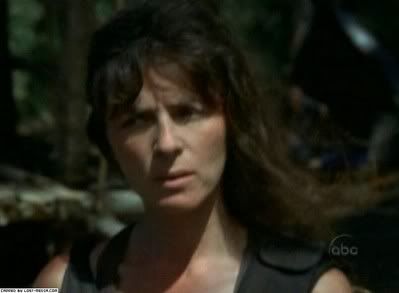
Although perhaps it's a statement in itself that the only truly original female character on the show plays such a minor and sporadic role in the story.
Rose was a character who could have matched Locke in faith and who had the ability to stand up to Jack and be a mentor to the younger woman but she was never used.
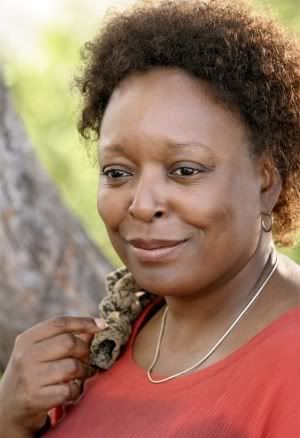
Each year her screen time diminished, dwindling down to a fraction of Aaron's facetime in the crib, until this year she was reduced to a mere cameo. And while it was sweet to watch her deliver a smackdown to Jack's signature pretentiousness in the finale, it was little consolation for the missed opportunity of watching a woman reflect some aspect within the microcosmic humanity outside of the proscribed lines of her sexuality. A lost opportunity indeed.
It's true that, with the exception of poor Clare,
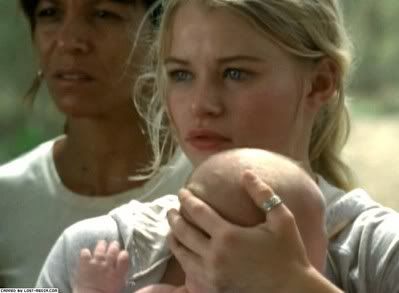
no woman has been forced into a perfect straitjacket of either Madonna or Whore.
Sun is a more layered and textured character than Clare. She has had her turn at Whore-dom
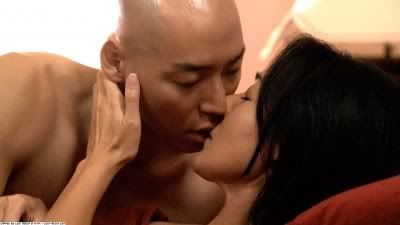
but it's never been shown as a simple thing. She loves a difficult man, but she's also been partially responsible for his difficulties. She sold him out to her father, in order to protect him from a knowledge of his mother (one female character who was literally both mother and whore). She has lied, cheated, poisoned and been secretive, but she is also loving and passionate and she has tried to assert her individuality despite being born into a life of silent invisibility.
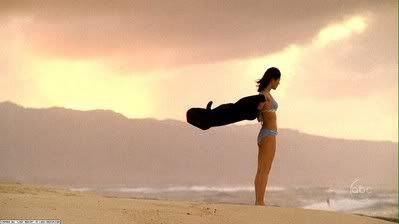
Sun is at the least a complex character, and it helps a great deal that she's played by such a subtle and ingenious actress. But in the end, Sun's entire story revolves around sex. She is a wife. An adulteress. And now a doomed mother.
Juliet is the newest female character on the show and perhaps the one ray of light we can find in the primary cast.
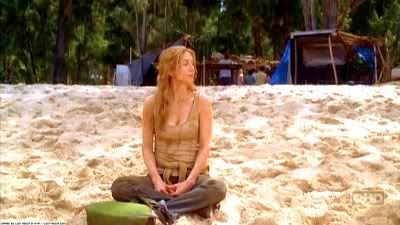
What makes Juliet unique among women is that her entire story does NOT, incredibly enough, revolve around sex. OK, she is an expert in sexual reproduction - you can't expect any female character to have an identity entirely divorced from sexual matters, can you? - but at least, she is an intellectual and an accomplished professional as well.
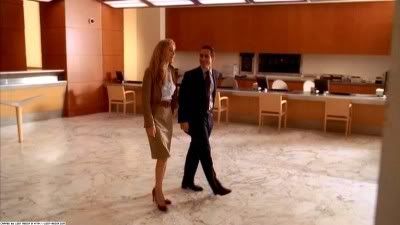
She has entered Ben's inner circle as a trusted advisor and made an alliance with Jack that is based on their mutually cerebral natures. It is possible that Juliet's story line will follow a path that allows her to become instrumental in solving some of the great mysteries of the Island.
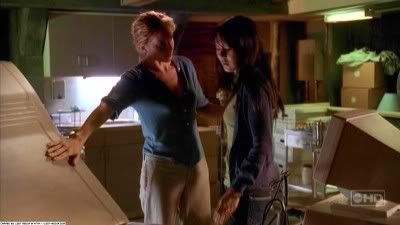
So for now, Juliet represents an aberration in the path that Lost has otherwise followed, of forcing female characters into purely sexual roles. However, her path is also crossed now with the great Hero of the tale,
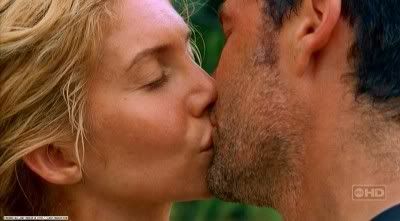
the one and only Jackinator, and that is dangerous territory indeed for any chances a woman has of being actualized as a full human being.
And since the spectrum of women on Lost is so very, very small, that brings us already to the last one, the main one - Kate.
Kate - perhaps the most disappointing and least respected character on the show. If any character speaks for the Lost writers when it comes to women, it's Kate.
When we first met her, it really seemed she would be an original. Introduced as the girl next door, with the kind, helpful, friendly personality that all sweet young girls are expected to have, we quickly learned she was anything but.
Kate was shown to be devious.
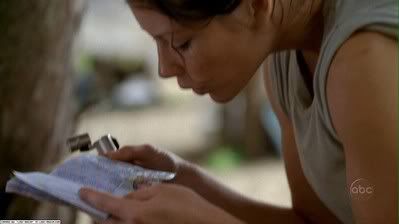
Ruthless.
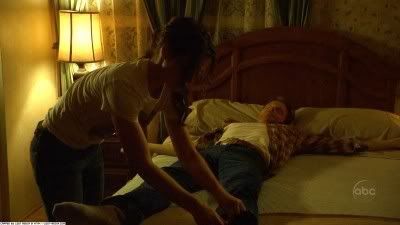
Violent.
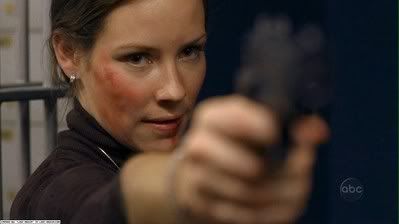
Selfish.
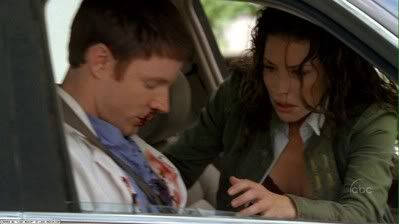
Sexually aggressive.
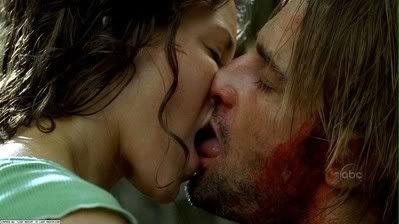
Impulsive.
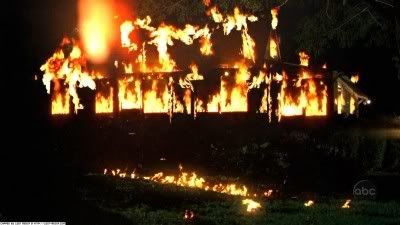
And maybe even a little bit nuts.
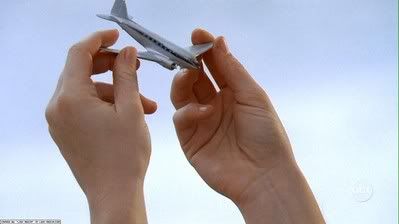
Kate was cool. What did it mean that she was the kind of person who would kill her own father because he gave her the wrong genes? How did she learn to be so many different people, to be in essence, whatever she wanted them to think she was? There was a sense of suspense early on to see how the dichotomy of this adorable but ruthless little runner would be resolved. Could it be this would be a character with real depth, someone indelibly feminine but never defined merely by her femininity? After all, in the end, all we're really looking to see is a version of the reality we experience as women, where our sexuality is only one of the infinite aspects of our humanity. Here we had a woman who wasn't sexually passive, but she wasn't a whore. She was kind and madonna-like, but she was also guilty of a major crime, for which she would, like any full adult, have to bear full responsibility. Right?
Right?
Unfortunately... No.
The character of Kate has at this point become the collateral damage of Lost's inability to free itself from the sexist conventions of our popular culture. Kate isn't the tomboy killer anymore. She isn't the lying chameleon with a million aliases. She isn't the clever conniver concocting self serving escape routes. Kate is nothing now except the woman that two male characters both love. Two male characters with deep and profound stories that go well beyond Kate, for whom loving Kate is only one of their many attributes. But for Kate, at this sad point in her journey, there is no story except the passive action of being the one dimensional sexual being loved by two multi dimensional human beings.
If Kate is to be defined as nothing but a prize between two men, the only thing to analyze about her is how this love triangle goes about defining this Leading Woman in the story. Because Kate with Sawyer and Kate with Jack are two very different things. They represent more than just two equally viable options. In fact they represent a choice between Woman as equal self actualized individual and Woman as the mere accessory in the journey of the all important male hero.
With Sawyer, sometimes Kate is on top.
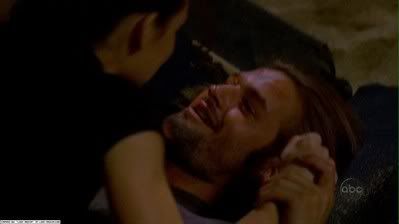
And sometimes not.
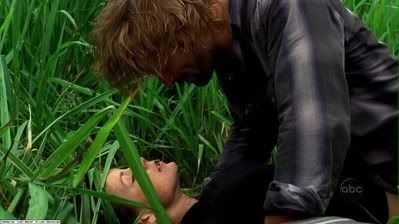
She is not a better human being than him, and she is not a worse one. They share a common shame. They are both killers.
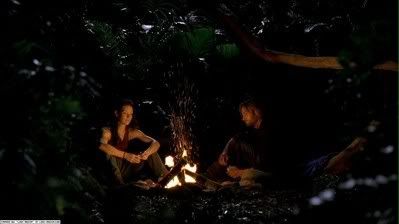
He openly appreciates her beauty.

And she openly appreciates his.

He doesn't presume to make her decisions for her.
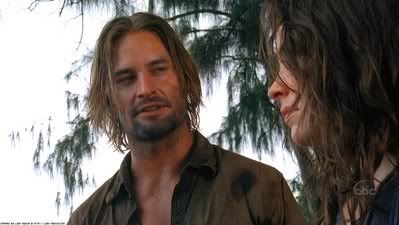
And she doesn't judge him for his.
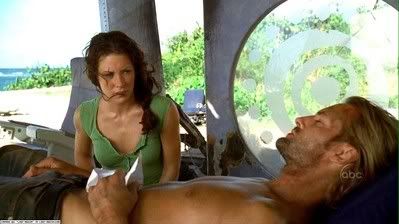
She takes care of him
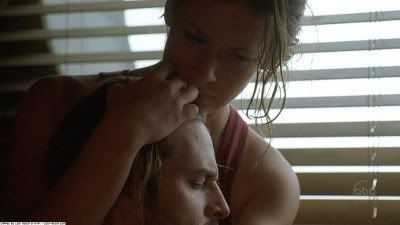
And he takes care of her.
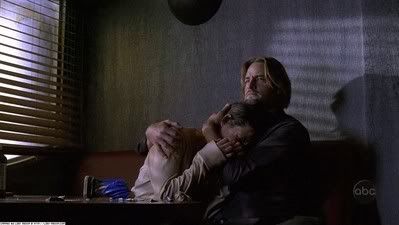
They are partners

Friends
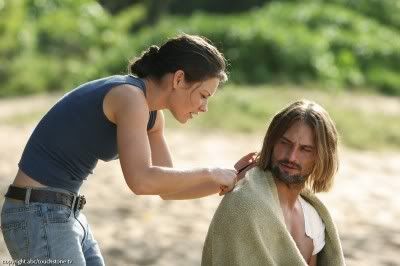
Lovers
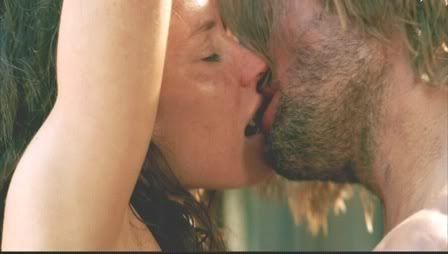
And share each others innermost secrets.
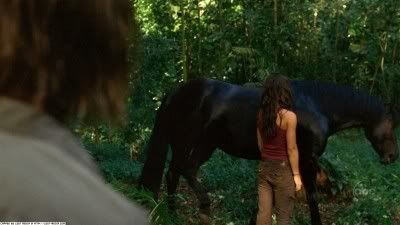
Without imposing moral standards upon their relationship, it seems with Sawyer, that Kate's identity remains intact. She is herself with all the messy potential that implies. Sawyer can be the Goddess or the Temptress in Kate's Hero's Journey, but with Sawyer in her life, Kate is still the Hero in her own tale. She will still have to make her own way morally and psychologically, still have to fight her own battles with herself and the world. But she will be able to reach her own Apotheosis and bring back the Magical Boon that she has earned for herself. Sawyer is a lover for Kate and a partner, but Sawyer is not a superior being to whom Kate must inevitably be subjugated. They remain individuals even when on a common path, and both their stories are equally vibrant, colorful and full of dramatic potential. With Sawyer, Kate will never be either Madonna or Whore. She can just be Kate. An individual. The hardest thing for any woman in this story to ever be.
With Jack, on the other hand, Kate is never on top.
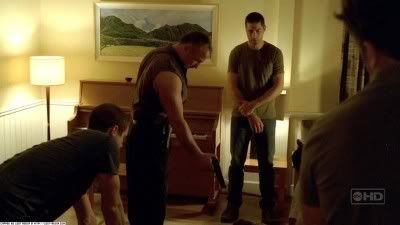
He chooses what's best for her.
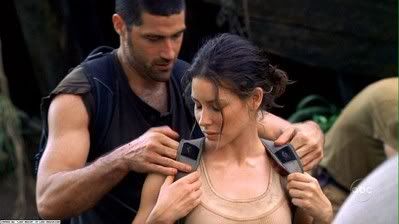
He orders her to do as he says.

He shames her when she does wrong.
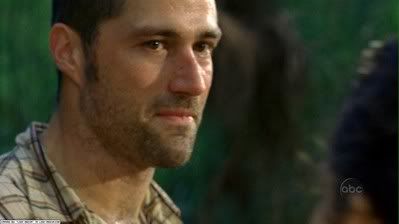
He withholds approval when she displeases him.
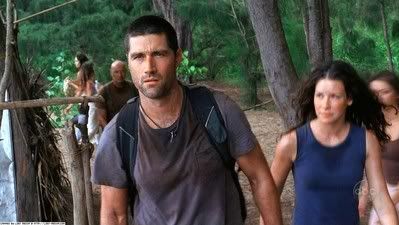
Her sexuality embarrasses him
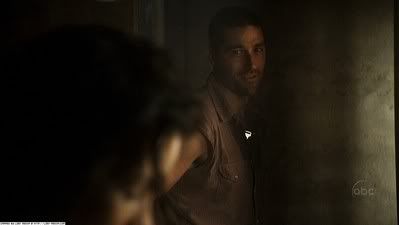
and her weaknesses disgust him.
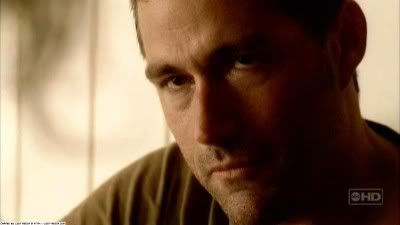
Jack has been presented by the writers as romantically viable for Kate, even though he treats her essentially as a judgmental father treats a disappointing daughter. And where a free spirited, assertive human individual like Kate would be expected to kick back at this kind of controlling, judgmental force in her life, Kate has instead been shown as internalizing his opinion of her, even seeking his forgiveness for her own actions from him, placing him in almost a godlike position in her life.
It's in the story of Jack and Kate that Lost reaches its feminist nadir. By placing Kate as a satellite in the story of this often deified hero, the Moses, the Jesus like Shepherd, her journey is reduced to its smallest possible potential. Instead of being the story of a human being seeking redemption and actualization, it becomes a cautionary Calvinist fable of the dirty, naughty girl looking to become purified for her morally superior mate. Jack doesn't just demand that the bad girl open the Pandora's Box that brings the evil weapons to Eden,
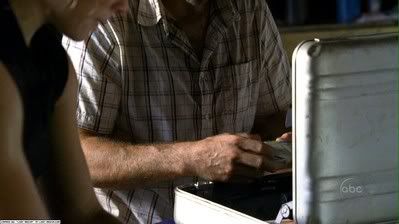
but he also wears the key to her privacy as a talisman of his dominion over her.
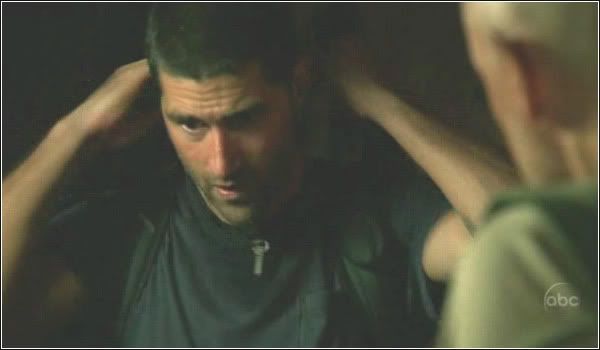
It all derives, perhaps, from the story of Adam and Eve, a metaphor many believe may become the defining image for this pair. Eve was in essence the original stupid bint. Because she was unable to follow one simple rule, poor, clueless Adam got tossed out of the ultimate luxury real estate. And Eve's moral inferiority then visited upon her daughters not merely the ancient pleasures of menstruation and 24 hour labor but also the more modern delights of bikini waxes and Cougars vs. Kittens on reality TV.
Kate doesn't want to be Eve.
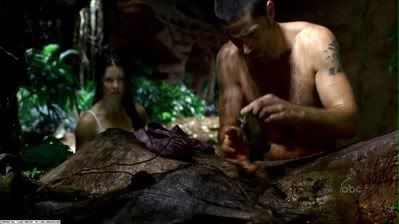
She doesn't want to do taco night.
But there is still the feeble child in her seeking approval from daddy,
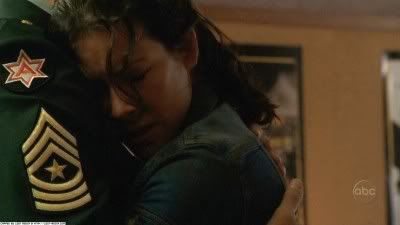
and if she is to get that from Jack, then the path leads straight through taco night to its inevitable stifling end. With Jack, Kate's story falls into the all too familiar pattern, the Temptress who is reformed by the Heroic male into his own custom made Goddess.
I don't want to neglect the idea that hope springs eternal. The story is far from over and there was an inkling of hope in Kate's autonomy and assertiveness with Jack in the season finale's final scene. But it's also important to face facts. After all, when faced with the options of a beautiful international cast of all genders, ages, races and classes, who did the writers choose as the singular representative of the "hero"?

Yup.
The rich white guy.
When all is said and done, Lost has chosen the most conventional hero available. Yet again, the infinite variety of human experience is being narrowed down to the same dull, repetitive viewpoint - the dominant male from the dominant culture. And it just may be that this is all that the consumers of pop culture want anyway.
A scene like this
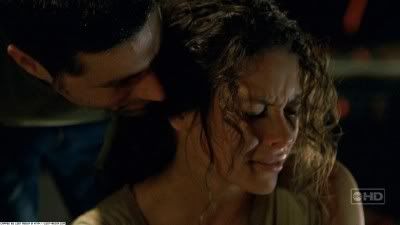
that is breathtaking just from the sheer ugliness of its cruel misogynist undertones, provoked this interpretation from a male viewer:
" Alright, the scene between Jack and Kate -- where to begin? First off, if you didn't love this scene, you probably also kill puppies for fun. Awesome scene on just about every level. It had a little mystery, a little romance, a little of everything. Phenomenal. "This same reviewer had previously registered his opinion of Kate's attempt at buying a slice of that hero pie for which apparently No Women Need Apply:
"Kate wants to storm the Others compound, guns blazing -- proving again that she's an idiot. "And even though this is just one example, a quick survey of the blogosphere will find this kind of interpretation recurs with depressing frequency. Even more unfortunately, it isn't just a male viewpoint. Modern women are proving just as compliant as their 1950s counterparts at buying wholesale into their own cultural irrelevance.
As an example, the act of Jack declaring his ownership and dominion by wearing the key to Kate's case around his neck brought out this response from this obviously intelligent fan, a woman no less:
"I would also like to comment on the key, which is, as has been pointed out, an important indicator of the placement of this episode of the larger story, but also a potent symbol of Jack’s power, within the group. It marks him as the keeper of the guns, or, to slide into the gutter, albeit in a highbrow way, the holder of the island’s sexual energy, or screaming mojo, if you will. It is worth noting that in future episodes the guns will be grabbed by an Anti-Hero figure, who serves as sort of a degraded shadow of the Hero in the story, but it is an essentially meaningless gesture, as he cannot steal what he is inherently incapable of possessing. In an existential sense, he is forever powerless in the presence of the Hero, no matter how he tries, in his bee-like frenzy, to deal from the bottom of the deck, or distract with talk of Floridian sexcapades, for all the Hero needs to exert his infinite and Divinely-bestowed superiority is a pair of nines and a smirk, and the Cosmic Order that dictates that Right Makes Might is once more restored. "
In this brave new post feminist world we've entered, the average woman may be expressing herself on a much more sophisticated level than the average man, but far too many are still only comfortable using their intelligence to obediently reinterpret the same archaic cultural stereotypes. It's more than a bit frustrating to argue that women deserve to see their full humanity reflected within their own culture, when so many women are so perfectly content with seeing women portrayed solely as the accessory to the journey of a male superhero, provided he's hot and dreamy and has...uh, screaming mojo (?) . It may not be fair to look to a TV show like Lost to unlock the cultural straitjacket that some women are so foolish as to willingly strap themselves into. But it's a point worth making that, as good as this show has been as a storytelling vehicle, it's still a story for, by and about men.
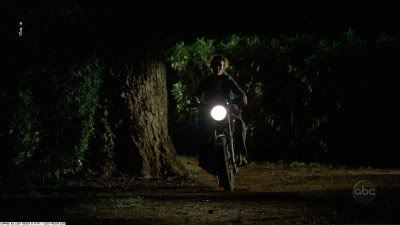
But that doesn't mean we have to stay silent about it.
4 comments:
Hey,
I know this post of yours was written a while ago but I just had to say how much I enjoyed and agreed with everything in it.
I hate that Jack and Kate ended up getting as far as engagement considering what a condescending jerk he's been to her in the past but at least we know she doesn't put up with it forever.
Great blog, keep up the good work!
I also had to comment even though it's been awhile. I believe you are right on in this assesment. It saddens me to see how embraced Juliet became in season 5 when she took a step down from being a cool complex character to a bacon frying, jealous, self-destructive housewife. The fanboys and unfortunately many women prefer that version of Juliet. I wish there was a way to circulate this article to all the fanboys in the world and TPTB.
LOL. This site is so pathetic. Get over it Skaters.
Thanks for posting thiis
Post a Comment